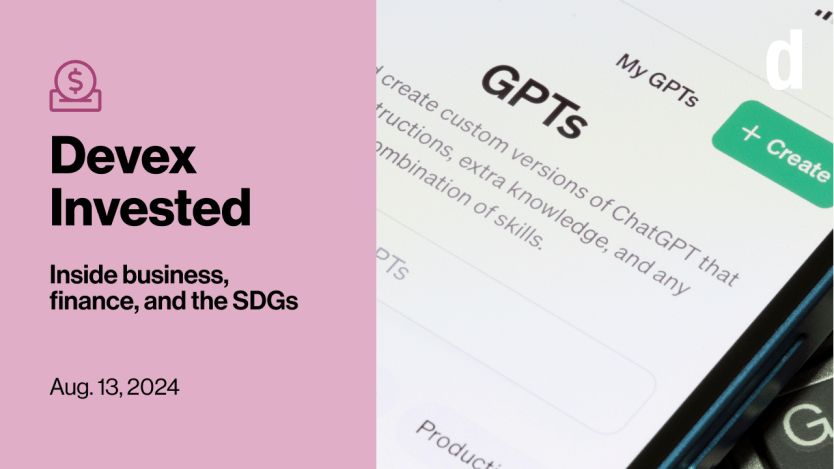Devex Invested: How VR and AI tech are already being used in global development

We’ve all heard the buzz about how artificial intelligence could change global health and development. Today we look at what’s really happening now in the world of AI and virtual reality.
First up, at our recent Devex Pro week event, experts from the Gates Foundation, OpenAI, and more, gave live demos of AI tools, including:
• A chatbot that provides information on COVID-19 cases in India, allowing users to interact with the data on their phones in their preferred language..
• A grant assist tool to help organizations decide whether to apply for a 207-page USAID request for proposals.
• mDoc, a Nigerian health tech startup, that employs a chatbot to answer questions from women with hypertension. Early results showed that the GPT outperformed the human health coach.
Read (and watch): 4 practical applications of AI in global development (Pro)
+ A Devex Pro membership lets you access all our exclusive reporting and analyses, members-only events, and the world’s largest development job board. Not yet gone Pro? Start your 15-day free trial today.
Futures made of …
And what about VR? Can we use virtual reality technologies to help first responders prepare for climate-driven disasters, conflicts, and pandemics?
That’s what four global health doctors and students ask in this recent opinion piece for Devex. Their answer, at least in these four examples, is yes.
• Natural disasters: VR can give clinicians realistic and customizable scenarios to train on, such as triaging victims. Take a look here.
• Conflict: VR can train in nontechnical skills too, such as communication, leadership, and ethical decision-making.
• Pandemics: VR can be used to improve the quality of training in areas with few resources.
• Complex planetary problems: VR could transform how we respond to the challenges of planetary health, the authors argue, notably by creating interoperable platforms that allow different countries and disciplines to share insights and strategies.
Opinion: How VR can help respond to the ‘3 Body Problem’ in global aid
What’s next
We hope you enjoyed our deep dive over the summer break into some of the stories we will be watching for the rest of the year.
Here’s a selection. Is there something we missed? Get in touch at vince.chadwick@devex.com.
• What will emerge from the World Bank’s Private Sector Investment Lab? And how much will shareholders shell out for the replenishment of the International Development Association?
• Can multilateral development banks flesh out an equitable approach to country platforms that puts those countries’ priorities first?
• What concrete proposals will emerge for reform of official development assistance and the OECD’s Development Assistance Committee, ahead of next year’s Financing for Development summit in Spain?
• What will the European Commission’s stated intention for a more “economic foreign policy” mean for its development work? And how far will Brussels go to try and create more opportunities for European companies abroad?
Read: Development finance under the microscope
And if you are feeling overwhelmed by who is proposing which reforms to the global financial architecture, don’t worry — members of the European Parliament’s development committee were too. Luckily, they have a department for external policies that they can ask to make sense of it all. And that’s what they try to do in this recent paper, with more work to be published shortly.
This graph sums it up:
"Reform of the global financial architecture in response to global challenges. How to restore debt sustainability
— Vince Chadwick (@vchadw) August 10, 2024
and achieve SDGs?" - via @EP_EPRS https://t.co/LR6SzvEE7E
Seems to lack column for "Politicians from the Global North" ... pic.twitter.com/3vFQdTzwQ1
Though we would have liked to see more on what Western governments think of the above.
Baku to the future
Another milestone this year will be setting a new climate finance goal post-2025 — the second major international finance goal under the U.N. Framework Convention on Climate Change. As climate journalist Tais Gadea Lara writes for Devex, the first one was the $100 billion annual commitment that, with its delays and difficulties, has left a trove of “do’s and don’ts” to draw on as countries set the new collective quantified goal or NCQG.
As Tais writes:
1. For developed countries that mobilize money: Establish a common framework of methodology to report the money mobilized, and thus avoid estimates with different numbers and guarantee a better overview of the progress of the goal.
2. For developing countries that receive the money: Specify the communication and methodology on the climate financing required for the fulfillment of their climate policies.
3. For both: Report more precisely the effectiveness of the money mobilized. Did it actually contribute to climate action in a meaningful way? Has it resulted in emission reductions or in increased adaptation?
Read: Lessons from the $100B target can shape the next climate finance goal (Pro)
+ Your Devex Pro membership lets you get the most out of our climate change coverage.
Local giving
Your next job?
Director, Gender, Women and Civil Society
African Development Bank
Côte d'Ivoire
The African Philanthropy Forum of more than 3,500 philanthropists and social investors wants to see local aid on the continent exceeding international assistance by 2030.
To get there, one challenge is to get the wealth of the estimated 138,000 high-net-worth individuals in Africa flowing more readily across borders.
In their opinion piece for Devex, global health expert Constance Shumba and FHI 360 vice president for eastern and southern Africa Dr. Otto Chabikuli argue that local philanthropy would “promote African perspectives and values in development initiatives, rather than copying those of high-income countries, to ensure projects are responsive to actual needs and elevate voices of local stakeholders.”
Opinion: African philanthropy promises dynamic responses to local needs
Homeward bound
Last year this time, we wrote about the power of remittances, which Pedro de Vasconcelos from the United Nations agriculture fund, IFAD, called over $640 billion a year hiding in plain sight.
Now Devex contributing reporter Sophie Edwards has taken a look at what we know about where this money is going currently, and whether it can help reduce poverty.
The top countries for remittances in 2023? India with $120 billion, followed by Mexico with $66 billion, China with $50 billion, and the Philippines with $39 billion.
They can be a powerful tool — akin to the current focus on the importance of cash transfers. But they are still too expensive to send, with a global average cost of 6.4% last year, well above the U.N. target of 3% by 2030.
The World Bank’s Multilateral Investment Guarantee Agency is now looking at offering guarantees to mitigate the risks for money transfer companies. The hope? Help transfer companies grow their presence around the world, potentially bringing down costs even further.
Read: Remittances outstrip aid 3 times over. Can they transform development? (Pro)
What we’re reading
Global development finance — outlook and prospects: Part 1 and Part 2. [Dev Policy Blog]
Development finance expert Avinash Persaud is championing a proposal to protect emerging market investors from currency swings. [Financial Times]
‘The IMF has released a technical but important policy, which should lead to countries being given more debt relief. But …” writes Tim Jones, head of policy at Debt Justice. [Tim Jones, X]
Search for articles
Most Read
- 1
- 2
- 3
- 4
- 5








